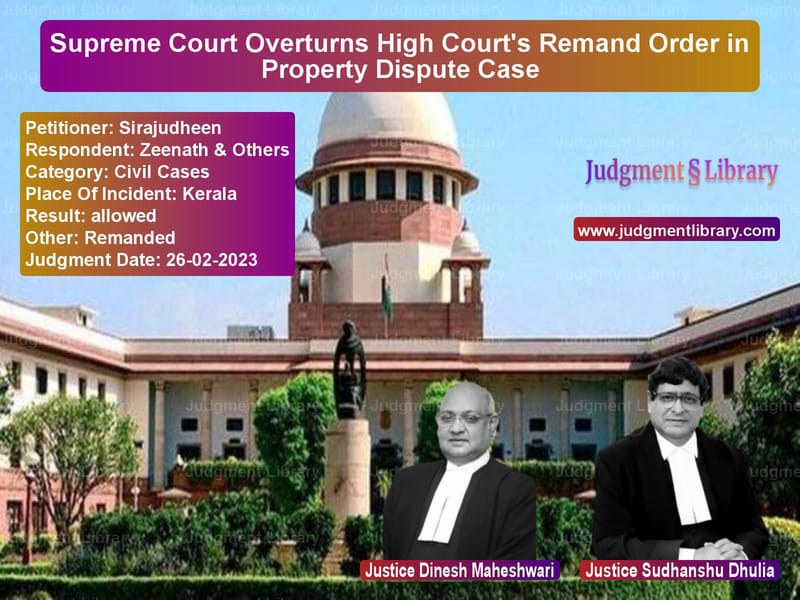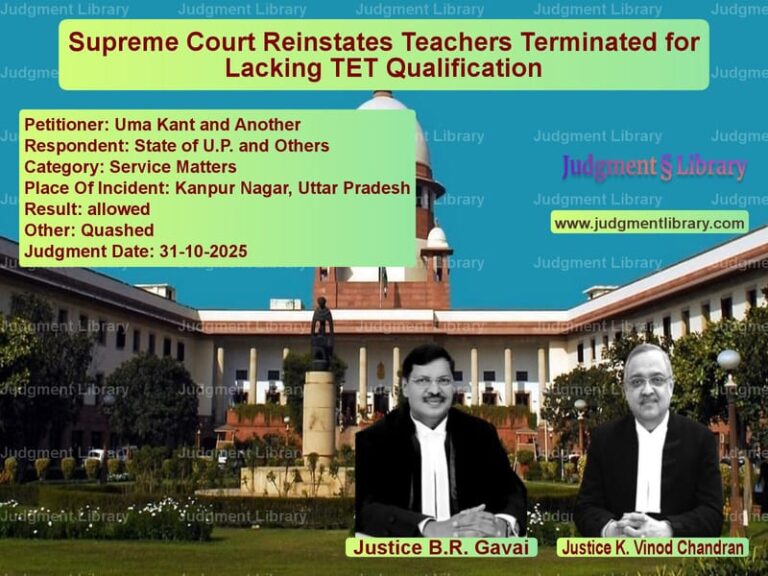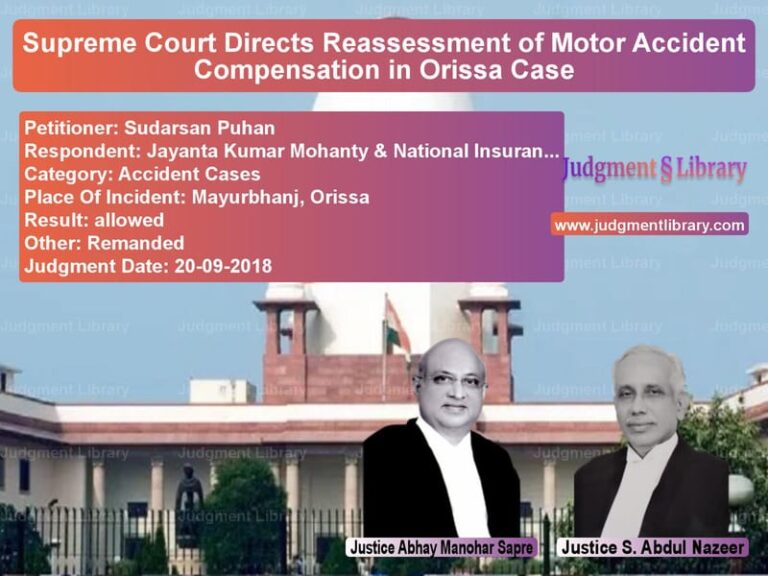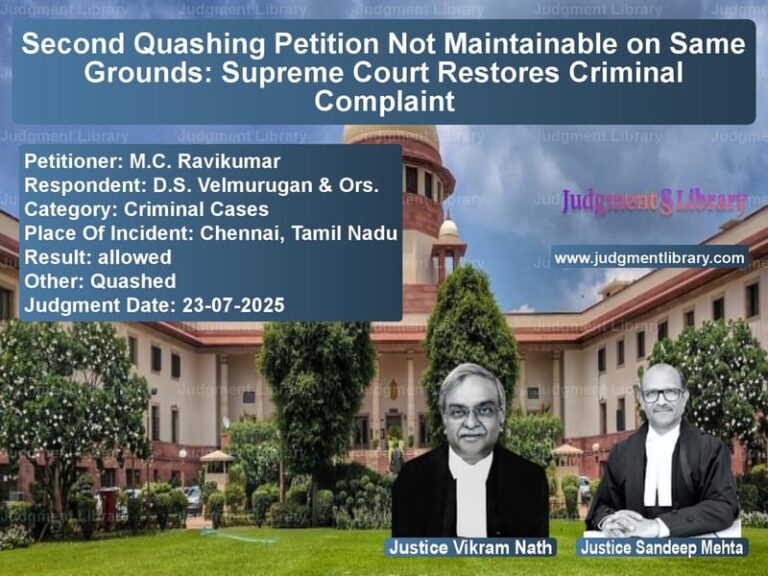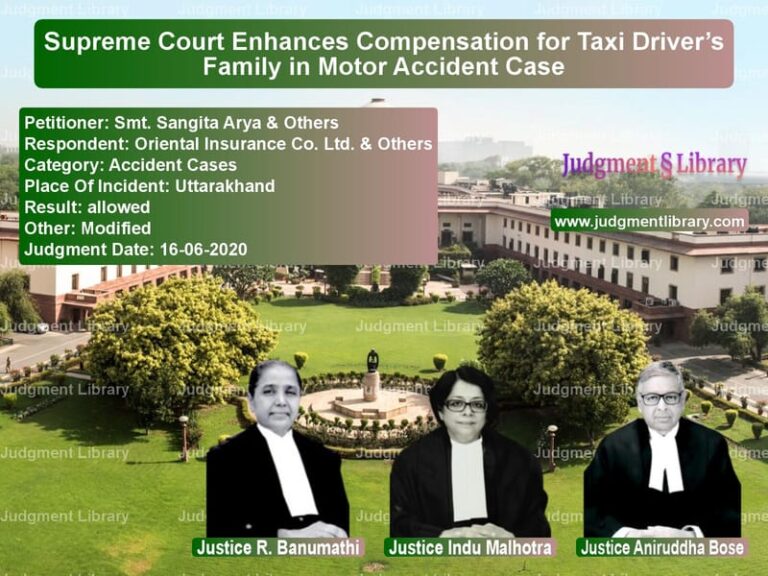Supreme Court Overturns High Court’s Remand Order in Property Dispute Case
The Supreme Court of India recently ruled on a long-standing property dispute in the case of Sirajudheen vs. Zeenath & Others. The case involved issues related to property ownership, fraudulent sale deeds, and partnership arrangements. The Supreme Court overturned the Kerala High Court’s decision to remand the case for a fresh trial, citing the lack of justification for the remand and the failure of the plaintiff to establish her case.
Background of the Case
The dispute involved a piece of land and a cinema theatre building in Kerala, which originally belonged to the father of the parties involved. After his death, the property was partitioned among his daughters, who also entered into a partnership agreement to run the theatre. The plaintiff, Zeenath, later claimed that she had unknowingly signed a sale deed transferring her share to the defendant, Sirajudheen. She alleged fraud and sought to cancel the sale deed.
The trial court dismissed Zeenath’s suit, ruling that she had failed to prove fraud or coercion. However, the Kerala High Court remanded the case for a fresh trial, stating that crucial evidence had not been presented. Sirajudheen then appealed to the Supreme Court, challenging the High Court’s decision.
Arguments by the Petitioner (Sirajudheen)
- The plaintiff had ample opportunity to present evidence in the trial court but failed to do so.
- The High Court’s decision to remand the case was unjustified, as the trial court had already considered all relevant evidence.
- Under Order XLI Rule 23-A of the Code of Civil Procedure (CPC), remand is justified only when a retrial is necessary, which was not the case here.
- The plaintiff did not call crucial witnesses, including the Sub-Registrar who registered the sale deed, raising doubts about her claims.
- The plaintiff’s failure to testify in court meant that adverse inferences should have been drawn against her under Section 114(g) of the Evidence Act.
Arguments by the Respondent (Zeenath)
- She was misled into signing the sale deed, believing it was a security document for a film distribution deal.
- No consideration was received for the alleged sale, making the transaction void.
- The High Court was justified in remanding the case because crucial evidence was missing from the trial court proceedings.
- Section 120 of the Evidence Act allows a husband to testify on behalf of his wife, making her husband’s testimony valid.
Supreme Court’s Analysis and Judgment
The Supreme Court reviewed the High Court’s decision and found that it had failed to provide a valid reason for remanding the case. The Court noted the following key points:
- High Court’s Failure to Address Trial Court’s Findings: The Supreme Court observed that the High Court did not examine the trial court’s findings before ordering a retrial.
- Burden of Proof Not Met: Zeenath failed to present evidence proving fraud, coercion, or undue influence.
- Adverse Inference Against the Plaintiff: Since Zeenath did not testify or call crucial witnesses, the Court ruled that adverse inferences should be drawn against her.
- Remand Not Justified Under CPC: The Court clarified that under Order XLI Rule 23-A, a case should only be remanded when the original judgment is reversed and a retrial is necessary.
- Finality of Legal Proceedings: Allowing unwarranted remands would delay justice and burden the courts.
The Supreme Court ultimately ruled:
“The High Court was not justified in remanding the matter for trial de novo without recording any finding if the plaintiff was prevented from examining herself or from adducing any other evidence as also without explaining as to on what ground the decree was being reversed.”
Final Verdict
- The Supreme Court overturned the Kerala High Court’s decision.
- The original trial court ruling dismissing Zeenath’s suit was reinstated.
- The case will not be sent back for retrial, ensuring that legal proceedings do not become unnecessarily prolonged.
This judgment reinforces the principle that a party must present all available evidence during the initial trial and cannot rely on remand as a second opportunity to prove their case.
Petitioner Name: Sirajudheen.Respondent Name: Zeenath & Others.Judgment By: Justice Dinesh Maheshwari, Justice Sudhanshu Dhulia.Place Of Incident: Kerala.Judgment Date: 26-02-2023.
Don’t miss out on the full details! Download the complete judgment in PDF format below and gain valuable insights instantly!
Download Judgment: sirajudheen-vs-zeenath-&-others-supreme-court-of-india-judgment-dated-26-02-2023.pdf
Directly Download Judgment: Directly download this Judgment
See all petitions in Property Disputes
See all petitions in Contract Disputes
See all petitions in Judgment by Dinesh Maheshwari
See all petitions in Judgment by Sudhanshu Dhulia
See all petitions in allowed
See all petitions in Remanded
See all petitions in supreme court of India judgments February 2023
See all petitions in 2023 judgments
See all posts in Civil Cases Category
See all allowed petitions in Civil Cases Category
See all Dismissed petitions in Civil Cases Category
See all partially allowed petitions in Civil Cases Category

